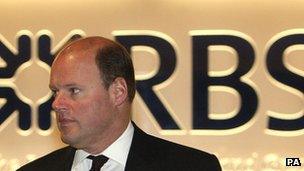Hester: I, Not Robot
- Published
- comments

Stephen Hester revealed he came close to resigning
Stephen Hester's interview on Today, external made it absolutely clear that the chief executive of Royal Bank of Scotland - bruised and battered by political and media attacks on his bonus - came pretty close to resigning.
"I am not a robot" was his resonant description of how he felt on seeing himself turned into a symbol of the alleged excesses of the banking industry. There have been "deeply depressing moments", he said, but "in the end I came to the conclusion it would be indulgent for me to resign".
He dodged James Naughtie's questions about whether the gap between rich and poor, between the pay of banker and nurse, had become too wide - insisting that was a matter for politicians. All he would say is that it is fatuous to argue about who gets the biggest piece of the pie if there is no pie at all.
The big point he was trying to make is that an uncontrolled explosion of RBS - the detonation of what he called the "biggest timebomb in banking history" - would have deprived millions of British people of almost any pie at all.
He used the astonishing phrase that the £45bn we as taxpayers have injected into Royal Bank of Scotland to save it had been "lost". What he meant by that is that the £45bn was never enough to cover all the costs of writing off RBS's bad loans and investments, selling and closing bad businesses and making the bank more efficient.
In his letter to RBS employees yesterday he said those aggregate costs had been £38bn since he took the helm at the beginning of 2008, not including results for the fourth quarter of 2011. We can assume that when those results are announced in a couple of weeks, the costs of cleaning up RBS will be in the ballpark of £45bn - and that won't be the end of the painful matter.
Of course RBS retains a "core" banking operation - the one used by millions of individuals and businesses - that is immensely profitable. Ignoring the bad stuff at RBS, that core bank is probably now performing very similarly to Barclays. RBS wouldn't be alive if the core bank hadn't generated profits of £33bn over the past three years.
RBS boss Stephen Hester: "Other people decide what to pay me"
So if taxpayers' £45bn was lost from the moment it was put into RBS, can it ever be returned to us?
Well it can, as and when profits from the core of the bank exceed the costs of the clean-up. As I say, we'll soon have confirmation that RBS was still making losses in 2011. And unless there is a sudden solution to all the eurozone's woes, which are making conditions hideous for most banks, a return to profit at RBS probably won't happen in 2012.
But the trends are of diminishing losses. So the day when RBS looks like less like a timebomb and more like a golden-egg laying goose may not be too far off.
As for Stephen Hester's personal agony, what can he and other bank chief executives do to restore the reputations of themselves and their institutions?
As it happens, bank bosses were given a bit of unsolicited advice last night by Lord Levene, the former chairman of Lloyd's insurance market (who did a good deal to restore its reputation - and its finances) and is currently chairing a business, NBNK, that's been struggling to buy a bank. In a speech to the Worshipful Company of International Bankers, Lord Levene said:
"If we examine the business model of many of the largest financial institutions operating today in the UK, you will find that a large part of their operations, are concerned with trading with each other in products that operate virtually in a closed loop and are not relevant in the wider economy.
"Where activity in banks is completely disconnected from the real world, then ultimately it will create no value except for those people involved in it. It potentially destroys value elsewhere, and the whole thing crashes. The wrong people make off with the money. We have, sadly, seen plenty of evidence of this over the past few years.
"So, part of our responsibility, as an industry, is to ensure that all our activities connect to the real economy. Banks should be there to provide services, not to be self-serving."
Lord Levene is having a pop at much of the activity of investment bankers, developing a theme that's also been explored by Lord Turner, chairman of the Financial Services Authority - which is that too many financial transactions are essentially bets (and hugely complex ones) by banks and other financial institutions, rather than genuine attempts to reduce the costs and risks of borrowing for households and businesses (or, conversely, to prudently increase the returns from saving and investing, for households and businesses).
Here is a striking statistic I've cited before: between 1997 and 2007, the value of foreign exchange trading - a proxy for financial trading in general - rose in value by 234 times, when the nominal value of global GDP, the value of everything produced annually in the world, increased just seven times.
Lord Turner has argued that there's very little evidence that this explosion in financial trading had any impact on the pace at which the world has become richer - and it had the pernicious effect of helping to take the banking system to the brink of total collapse in 2008, thus contributing to our current economic malaise.
The trading boom has of course enriched large numbers of bankers, hedge-fund managers and other players in the financial industry. But you probably only attach a high utility to that if you happen to be a banker or hedge-fund manager.